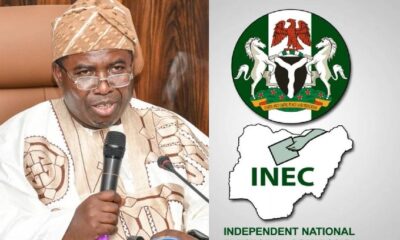Politics
BREAKING: National Assembly Proposes New Date for 2027 General Elections
The National Assembly has proposed moving the 2027 presidential and governorship elections to November 2026 under the new Electoral Act Amendment Bill 2025.

- The National Assembly has proposed moving the 2027 presidential and governorship elections to November 2026 under the new Electoral Act Amendment Bill 2025, aiming to conclude all court cases before the 2027 handover and modernize Nigeria’s electoral system through electronic voting.
Nigeria’s electoral calendar may soon witness a major shake-up as the National Assembly proposes that the 2027 presidential and governorship elections be held in November 2026 — six months before the end of the current administration’s tenure.
The plan, contained in the Electoral Act (Amendment) Bill 2025, aims to ensure that all election litigations are fully resolved before the May 29, 2027 inauguration of new leaders — addressing the long-standing issue of court cases overlapping into a new government’s term.
The proposal was unveiled during a public hearing jointly organised by the Senate and House Committees on Electoral Matters in Abuja, attended by politicians, civil society groups, and representatives of the Independent National Electoral Commission (INEC).

Under the draft amendment, elections for President and Governors must be conducted no later than 185 days before the expiration of their tenure, effectively shifting the poll date to November 2026, instead of the traditional February or March window.
Section 4(7) of the proposed law states:
“Elections into the office of the President and Governor of a State shall be held not later than 185 days before the expiration of the term of office of the last holder of the office.”
A similar clause applies to the National Assembly and State Assembly elections, aligning the entire electoral timetable.
Chairman of the House Committee on Electoral Matters, Hon. Adebayo Balogun, explained that the reform seeks to ensure that all election disputes — from tribunal to Supreme Court — are concluded before the swearing-in of winners.
DON’T MISS: Akpabio Vows Senate Won’t Be Held Hostage by ‘Disruptive Lawmakers’
“We are proposing that tribunal judgments be concluded within 90 days, appeals within 60 days, and Supreme Court decisions within the remaining period,” Balogun said.

To complement the changes, lawmakers also plan to amend Sections 285 and 139 of the 1999 Constitution, which currently govern the timelines for election petitions.
The bill further introduces mandatory electronic voting and electronic transmission of results, addressing long-standing calls for transparency. Section 60(5) provides that election results be transmitted both electronically and manually, with stiff penalties — including a ₦1 million fine or one-year imprisonment — for officials who violate the rules.
Another innovation is early voting, which allows security personnel, INEC officials, journalists, accredited observers, and ad-hoc staff to vote up to 14 days before election day to ensure they are not disenfranchised.
Representatives of INEC, led by Prof. Abdullahi Zuru, welcomed the proposed reforms, describing them as vital for “enhancing electoral credibility, better planning, and easing post-election judicial pressure.”

Civil society groups and political parties also lauded the proposed amendments, calling them “bold, timely, and essential for restoring public confidence in Nigeria’s elections.”
If enacted, the Electoral Act Amendment Bill 2025 could fundamentally reshape Nigeria’s electoral process — ensuring timely justice, smoother transitions, and stronger democratic stability.






















